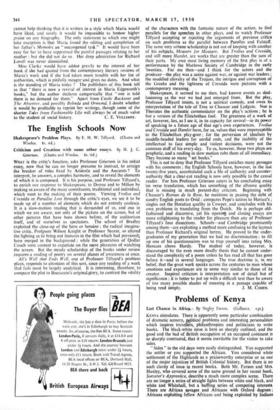The English Schools Now
WHAT is the critic's function, asks Professor Grierson in his initial essay, now that he can no longer presume to instruct, to arraign the breaker of rules fixed by Aristotle and the Ancients ? To interpret, he answers, a complex harmony, and to reveal the elements of which it is composed. It is his purpose, and Professor Tillyard's, to enrich our response to Shakespeare, to Donne and to Milton by making us aware of the many constituents, traditional and individual, which went to the making of their poems. Viewing Troilus and Cressida or Paradise Lost through the critic's eyes, we see it to be made up of a number of elements which do not entirely coalesce. It is a slow-motion reading that is demanded of us, and one in which we are aware, not only of the picture on the screen, but of other pictures that have been shown before, of the auditorium itself, and of ourselves as spectators. The school of Bradley exploited the close-up of the hero or heroine ; the radical imagina- tive critic, Professor Wilson Knight or Professor Saurat, so altered the lighting as to bring out features in the film which had previously been merged in the background ; while the generation of Quiller Couch were content to expatiate on the mere pleasures of watching the screen. But the steady scholarship of the books under review requires a reading of poetry on several planes of awareness at once.
All's Well that Ends Well, one of Professor Tillyard's problem plays, responds to attention of this sort, since any reading of a work that fails must be largely analytical. It is interesting, therefore, to compare the plot to Boccaccio's original story, to contrast the vitality
of the characters with the fantastic nature of the action, to find parallels for the speeches in other plays, and to watch Professor Tillyard accepting or rejecting the arguments of previous critics on such problems as the parallel between Parolles and Falstaff. The same very urbane scholarship is not out of keeping with another of his subjects, Measure for Measure. But Troilus and Cressida, and still more Hamlet, are works that are greater than the sum of their parts. My own most living memory of the first play is of a performance by the Marlowe Society of Cambridge in the early 'twenties. For me then—and I think for the actors and the producer—the play was a satire against war, or against war leaders ; the muddled chivalry of the Trojans, the intrigue and corruption of the Greeks and the lightness of Cressida were pictures with a contemporary meaning. Shakespeare, it seemed to me then, had known events as disil- lusioning as the war we had just emerged from. But the play, Professor Tillyard insists, is not a satirical comedy, and owes its interpretation of the tale of Troy to Chaucer and Lydgate. Nor is Thersites the authentic commentator on the play's actions ; he is but a version of the -Elizabethan fool. The greatness of a work of art, however, ties, as I see it, in its capacity for revival—in its power of speaking to a future age of that age's own experiences. Troilus and Cressida and Hamlet have, for us, values that were imperceptible to the Elizabethan play-goer ; for the perversion of idealism by muddle-headed leaders for sordid ends, and the inability of the intellectual to face simple and violent decisions, were not the common stuff of his every-day. To us, however, these two plays are prophetic, and a reading in slow motion robs them of all immediacy. They become so many " set books."
This is not to deny that Professor Tillyard enriches many passages with his comments ; the English Schools have, however, in the last twenty-five years, accurhulated such a file of authority and counter- authority that a clear-cut reading. is now only possible to the casual reader. For him Professor Grierson caters in his concluding essay on verse translation, which has something of the allusive quality that is missing in much present-day critcism. Beginning with Chaucer's Roman de la Rose, he mentions in passing the debt of sundry English poets to Ovid ; compares Pope's satires to Horace's ; singles out the Horatian quality in Cowper, and concludes with his own problems in translating from the Dutch. He is perhaps old- fashioned and discursive, yet -his openirt and closing essays are more enlightening to the reader for pleasure than any of Professor Tillyard's four dissections. Schools—and Cambridge prominently among them—are exploiting a method more confusing to the layman than Professor Richard's original heresy. He proved to the under- graduates of my generation that we had no discrimination ; to fill up one of his questionnaires was to trap yourself into rating Mrs. Hemans above Hardy. The student of today, however, is discouraged by the even more deadly thesis that he cannot under- stand the complexity of a poem unless he has read all that has gone before it—and in several languages. The true doctrine is, in my belief, that the great work speaks across the centuries to men whose emotions and experiences are in some way similar to those of its creator. Inspired criticism is interpretation not of detail but of significance ; it is better to put up with a difficult text than be aware of too many possible shades of meaning in a passage capable of


































 Previous page
Previous page